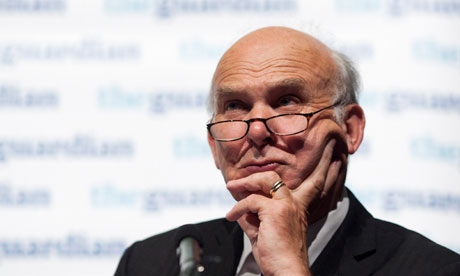Battle lines over "crony capitalism" were clearly drawn up on Sunday as the prime minister called for binding shareholder votes on top executives' pay, but seemed to reject as a gimmick Labour's call for workers on remuneration committees and for companies' pay ratios to be published.
Liberal Democrats stressed the importance of opening up boardroom remuneration committees to include figures who are more independent and able to restrict company heads from settling one another's pay and creating a "crony culture".
Lib Dem sources predicted haggling with their coalition partners over the detail, in the face of business lobbying.
The business secretary, Vince Cable, wants to see publication of company heads' pay as a single figure – total pay, including salary, long-term share plans, retirement schemes and other perks.
He also advocates publication of the difference between chief executives' pay and that of the average worker, as well as disclosure about the proportion of company profits paid to directors.
But the shadow business secretary, Chuka Umunna, said he doubted shareholders, such as pension funds, would be sufficiently interventionist to be able to curb boardroom pay.
He accused David Cameron of dragging his feet, adding: "There is no point giving shareholders a vote on executive pay without the greater transparency needed – so they can discern the aggregate remuneration executives receive under the complex arrangements currently in place."
Cable is due to publish detailed proposals shortly, following discussions with business next week, led by a speech on responsible capitalism by his party leader, Nick Clegg, next Monday.
Cameron's long-heralded intervention opens a hotly contested three-way debate between the parties on how to rein in corporate excess, and create a long-term investment culture in UK firms.
The debate will be a key test of Ed Miliband's ability to dominate an agenda he claims his party naturally owns.
Cameron said on Sunday that there had been a "market failure", with some bosses getting huge rises despite firms not improving their performance.
He also promised there would be shareholder votes to tackle large payouts for executives dismissed because of poor work. He said the measures would be included in a bill in the next Queen's Speech.
Speaking on the BBC he said: "Those big rewards when people fail make people's blood boil and is actually taking money from the owners of the company, the shareholders and everyone with a pension in Britain."
He indicated a move for more independent remuneration committee chairs, saying: "What's happened in the past is that with a lot of chairmen sitting on each other's remuneration committees, there's been a bit of back-scratching going on and a sort of circular process of rewards being pushed up across the board."
Labour claimed on Sunday that the government had not gone far enough, and called for workers to be on remuneration committees, an idea dismissed by Cameron as tokenistic.
But the idea was backed by the CentreForum thinktank, which is close to the Lib Dem leadership. The group called for immediate legislation to ensure employee representation on remuneration committees of boardrooms in firms employing more than 250 people.
Its report says: "Efforts to change behaviour without legislation have proved ineffective to date, and hence firmer action may be required."
Research from the Institute for Public Policy Research (IPPR) suggests chief executives in 87 of the FTSE 100 companies took home an average of £5.1m in basic pay, bonuses, share incentives and pension contributions in 2010-11.









